Triangle Strategy English Localization Adds, Removes, and Dramatically Alters Some Original Japanese Dialogue
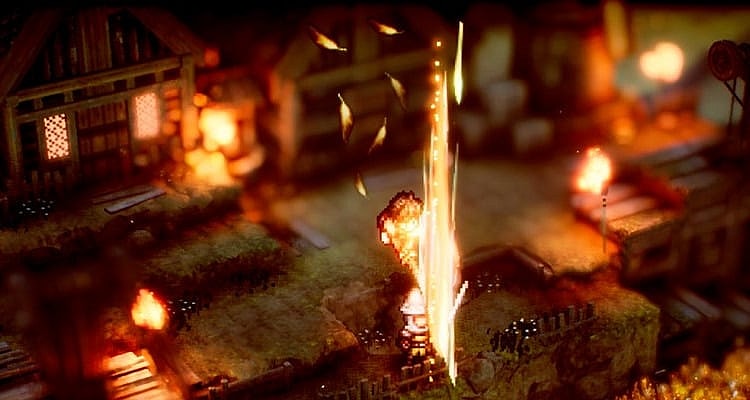
The English localization of Triangle Strategy has seemingly added, removed, and dramatically altered some lines from the original Japanese.

Video game censorship and localization-focused Twitter user @iuntue shared their translations of the strategy JRPG. “I’m liking it so far,” @iuntue tweeted, discussing Triangle Strategy with other Twitter users, “good gameplay and interesting story.”
“The translators generally do a good job with the formal Japanese translation, but there are some localizations.” @iuntue then showed two scenes with questionable changes to the original Japanese script.
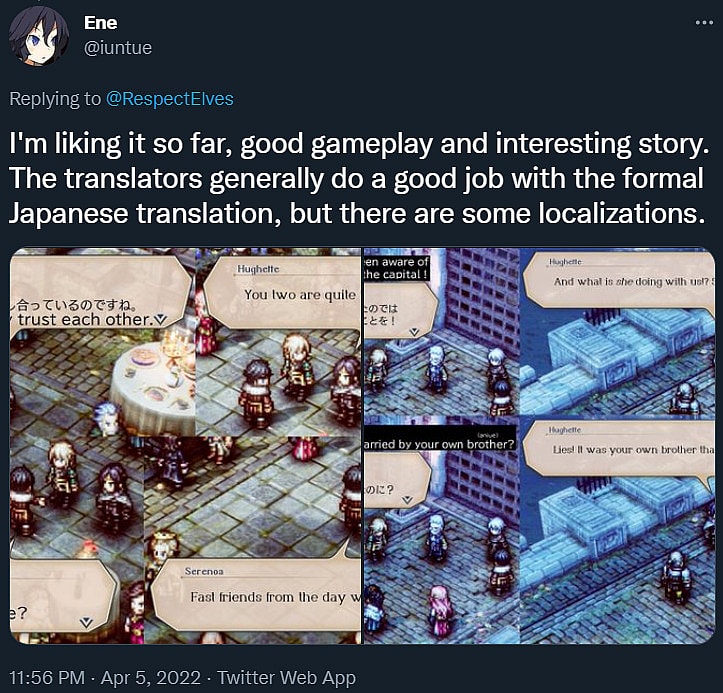
Firstly, when Serenoa notes that Hughette and Roland seem close, Serenoa asks who she is. In English, the exchange has Serenoa as more quippy, while Serenoa is also more trusting of her.
Japanese:
Hughette: … I see. So you both really trust each other.
Serenoa: And you are? (And she is?)
English:
Hughette: You two are quite the pair, aren’t you?
Serenoa: Fast friends from the day we met. And you are?
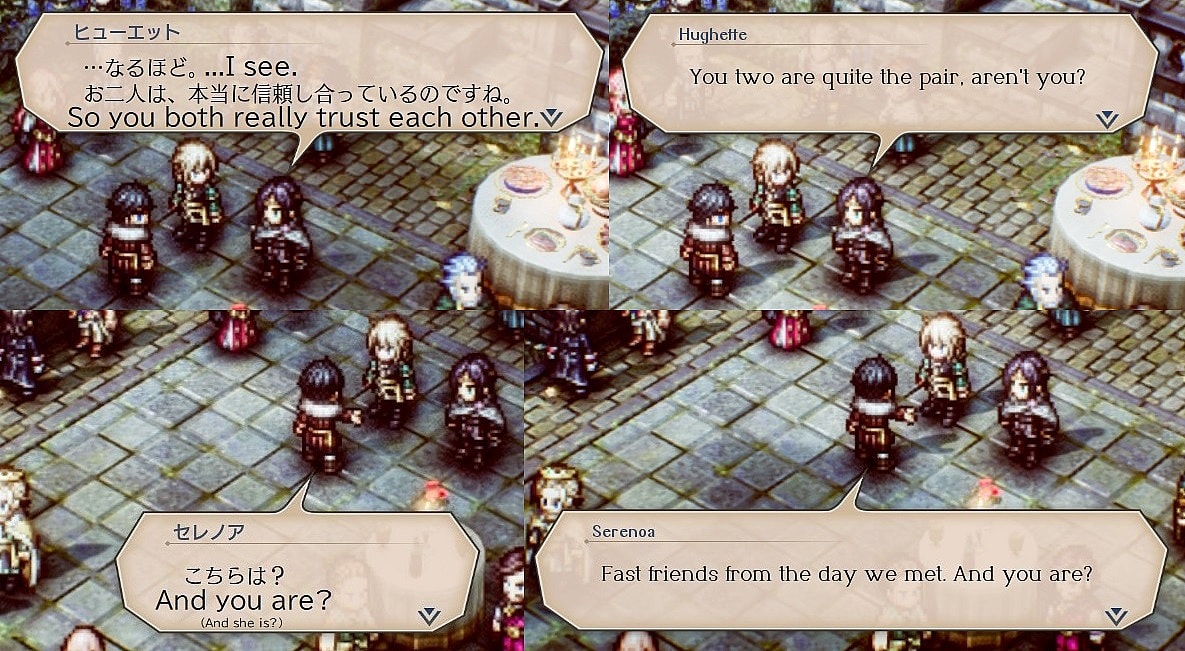
In another exchange between Serenoa and Frederica, in Japanese he appears to be making great pains to make her realize her own kinsmen- her brother among them- are attacking the city.
Yet in English, Serenoa seems much more hostile, bordering on assuming Serenoa had knowledge of the attack while she denies involvement.
Japanese:
Serenoa: Fredrica-sama, have you not been aware of this? About their plot to attack the capital! […] Is that really true? Even though the attack was carried by your own brother?
English:
Serenoa: And what is she doing with us!? She’s with the enemy! […] Lies! It was your brother that attacked the city!
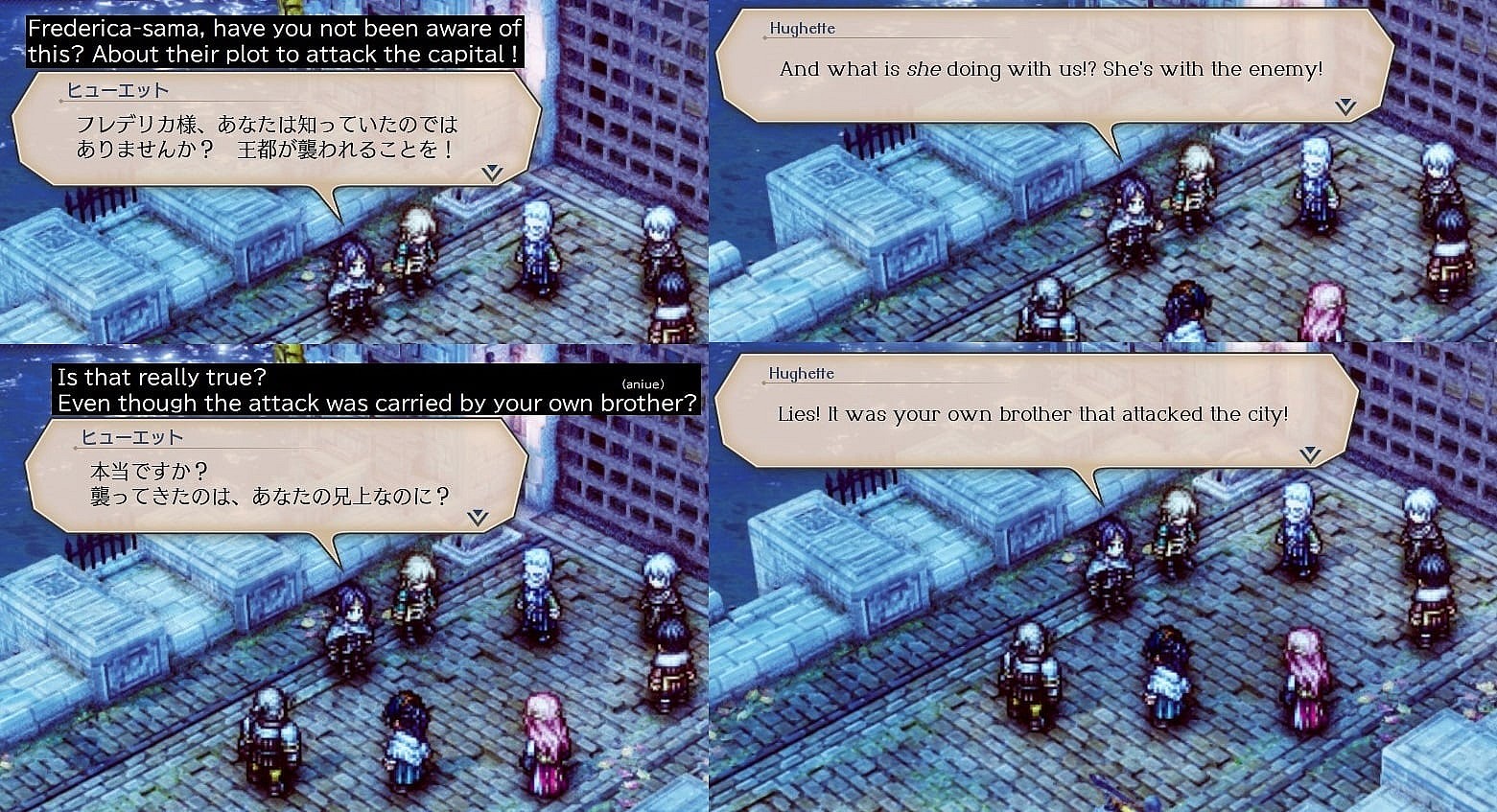
@iuntue would continue to give examples over the coming days replying to Twitter user @dragonmaster_x (quote tweeting another user joking that Agravain from Fate / Grand Order’s misogyny was “peak fiction”), who claimed, “Meanwhile, I’ve been instructed before never to use the word “woman” in direct address because it might be offensive to Western audiences.”
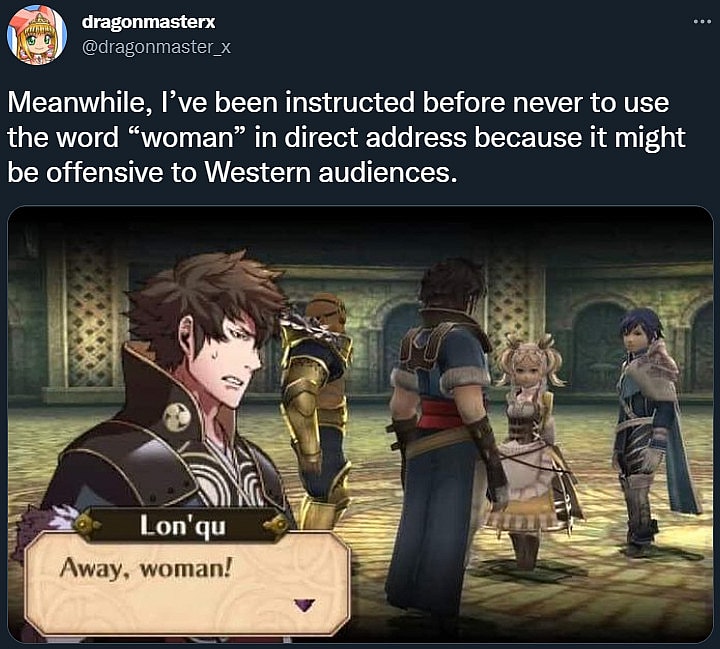
RELATED: Ghostwire: Tokyo English Localization Adds “Property Is Theft” Line Not Found In Original Japanese
@iuntue seemed to suggest a similar restriction had been foisted upon the Triangle Strategy localization team. They highlighted a scene where Thalas mocks Cordelia as being an impudent, “powerless woman” in Japanese.
Yet in English, it seems to soften Thalas’ contempt for being spoken to in such a manner by a woman.
Japanese:
Thalas: Humph! Quite impudent coming from a powerless woman.
English:
Thalas: It appears your impudence is contagious, Avlora. Your charge knows not how powerless she is.
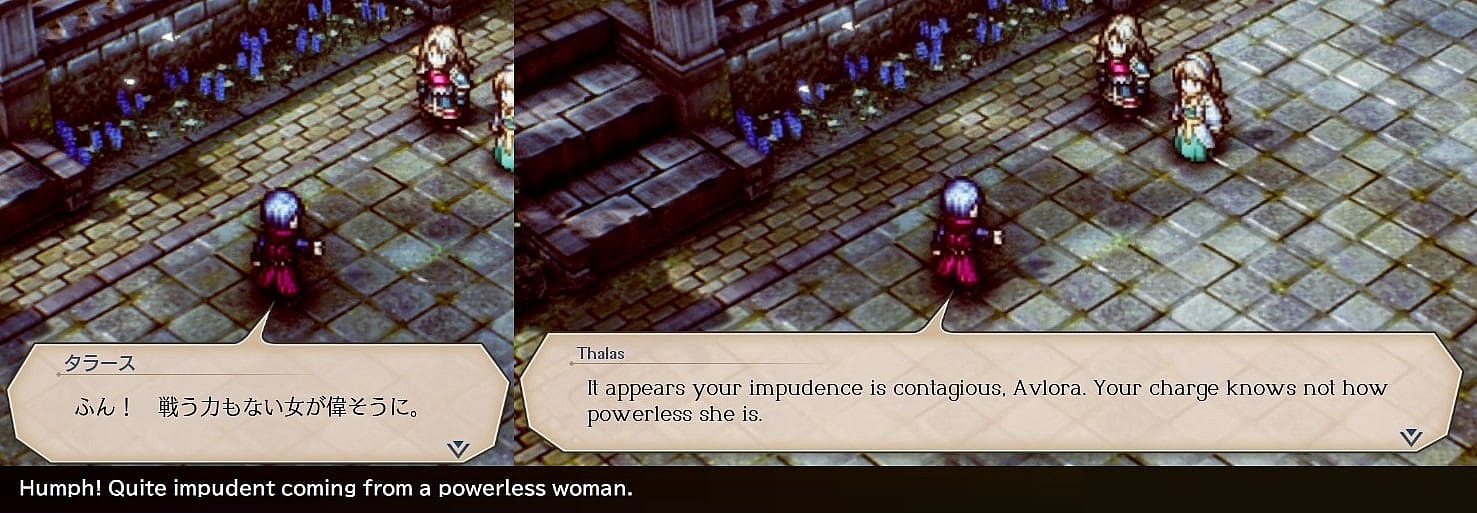
@iuntue continued to showcase the localization adding additional dialogue when there was none before. One scene in Triangle Strategy, after a drought has ended thanks to the efforts of Ezana, the townsfolk seem to be re-written to be more crass, as if to evoke them being commoners or lower born.
Further, though not noted by @iuntue, the NPC is called a townsperson, rather than a townsman. In Japanese they are roughly called “Wolffort Person” (machine translation via DeepL, “ウォルホート民 “).
Japanese:
Wolffort Person: Ooh, rain! It’s raining! It really started pouring!
English:
Wolffort Townsperson: Well, slap my ass like I was just born! Rain! Honest-to-goodness rain!

RELATED: Chrono Cross: The Radical Dreamers Edition Censors Panty Shots And Suggestive Dialogue
In the Japanese version of Triangle Strategy, Julio is shown in a flashback learning the king’s advisor had betrayed him for money. In Japanese he appears to quietly monologue to himself over how corrupt the advisor is. In English, it seems he was offered a bribe, which he outright rejects.
Japanese:
Julio: Kh… I had no idea to the extent of the nobility’s corruption.
English:
Julio: Coin? I spit on your coin.

“Welcome to western localization, the industry where the sentences are made up and the intent doesn’t matter!” quipped @Whirblewind. “They made it “”better””,” replied @iuntue, with yet another example.
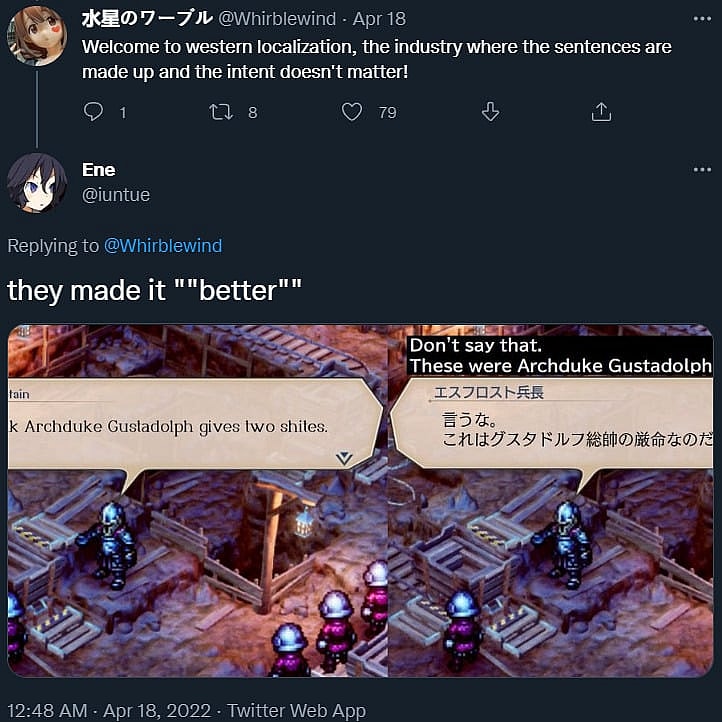
In Japanese, an Aesfrosti Captain demeans a soldier who was complaining about his orders, reminding him exactly where they came from. In English, rather than relying on rank, he crudely suggests the Archduke wouldn’t care for such whining.
Japanese
Aesfrosti Captain: Don’t say that. These were Archduke Gustadolph’s commands.
English
Aesfrosti Captain: Don’t think Archduke Gustadolph gives two shites.
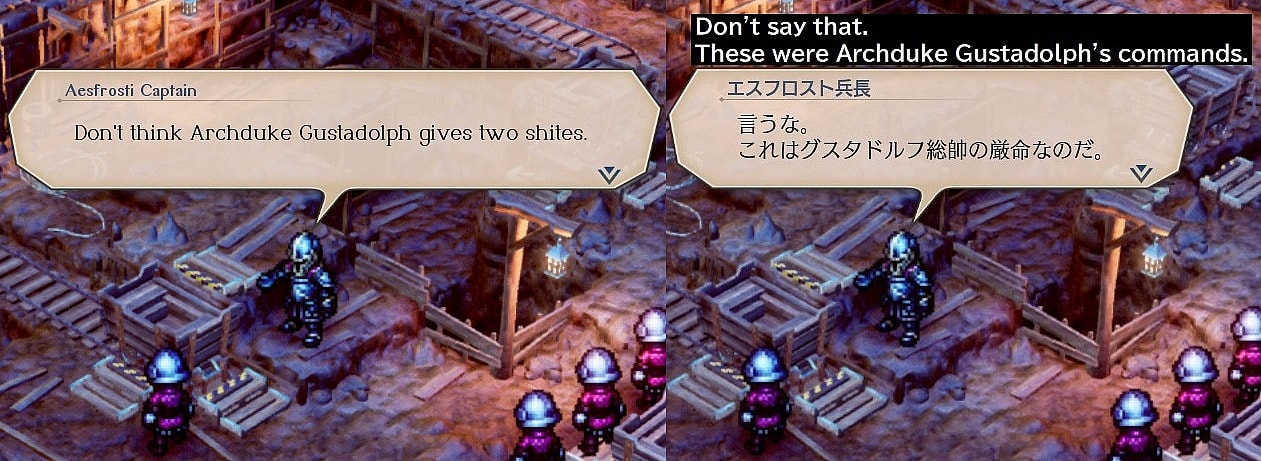
Amid two Twitter users discussing when changes were too excessive and when it still conveys the original intent while adding flavor (regarding the earlier drought-ending scene), @iuntue offered yet another questionable scene.
In a flashback, soldiers question shaman Ezana and her lover, claiming she used her magic to beguile people. In English however, she is accused of using this magic to terrorize them. Her lover- while suggesting the soldiers fear someone other than the Goddess of Salt being worshiped by the populous- also seems to use more flowery language.
Japanese
Hyzantian Soldier: So you’re Ezana. You’ve [sic] received claims that you’ve been leading people astray with dubious magic.
[…] Ezana’s Lover: Perhaps they were displeased by the sight of people being gathered around you. For they do not tolerate any faith other than that of the Goddess of Salt.
English
Hyzantian Soldier: Ah, so you’re Ezana. We’ve heard tell of a witch using her dark arts to frighten the peasants into submission.
[…] Ezana’s Lover: Perhaps they are threatened by the sight of the common folk huddled around your warming smile. The Goddess of Salt is a jealous mistress, after all, and Her subjects cannot well suffer another to be so adored.

“I’m so f—–g depressed we’ve regressed back to the working designs era where proper, accurate translations are non-existent,” @shaybryder lamented over the drought-ending scene. “Now I’m not concerned I didn’t pick this up”
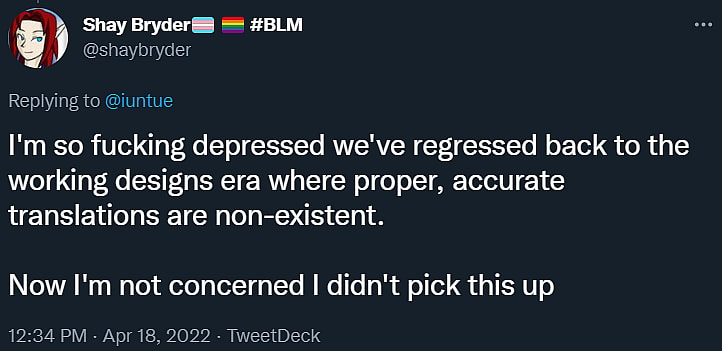
“It’s a good game and the translation is not all bad,” @iuntue surprisingly defended, “it’s just that there are a lot of lines that give of the ‘I made it better’ feel.”

@sie_kensou77 notes “english does have more varied expressions/exclamations but i want to know why this one?”
@iuntue replies “I didn’t translate this one, but the localization added ‘l’d give my first born for a drop o’ rain’,” showing a scene of peasants concerned that the drought will ruin their fields.
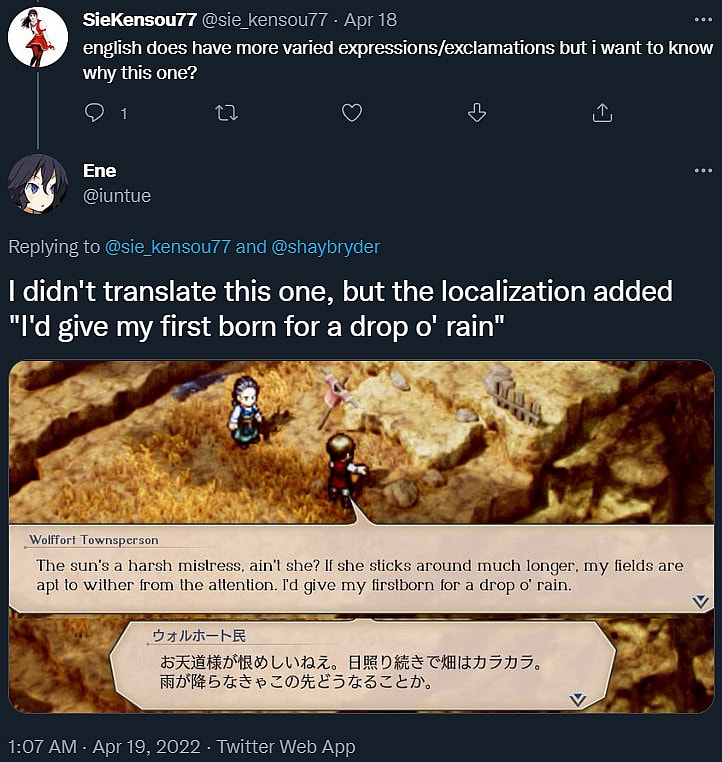
RELATED: My Hero Academia Fans Accuse My Hero One’s Justice 2 Season 2 DLC Featuring Midnight Of Censorship
Returning to their own highlights from Triangle Strategy, @iuntue showed how potentially controversial scenes were also seemingly censored.
In Japanese, Thalas offers an opposing female unit surrender in exchange for what could be interpreted as her becoming his mistress. In English, he instead commends her skills, and his comments could be taken as a monetary bribe.
Japanese:
Thalas: What a fine woman. Surrender to Aesfrost and I’ll take real good care of you, how about it?
English:
Thalas: Aesfrost could use a woman of your skill. Join us, and I’ll personally make it worth your while.
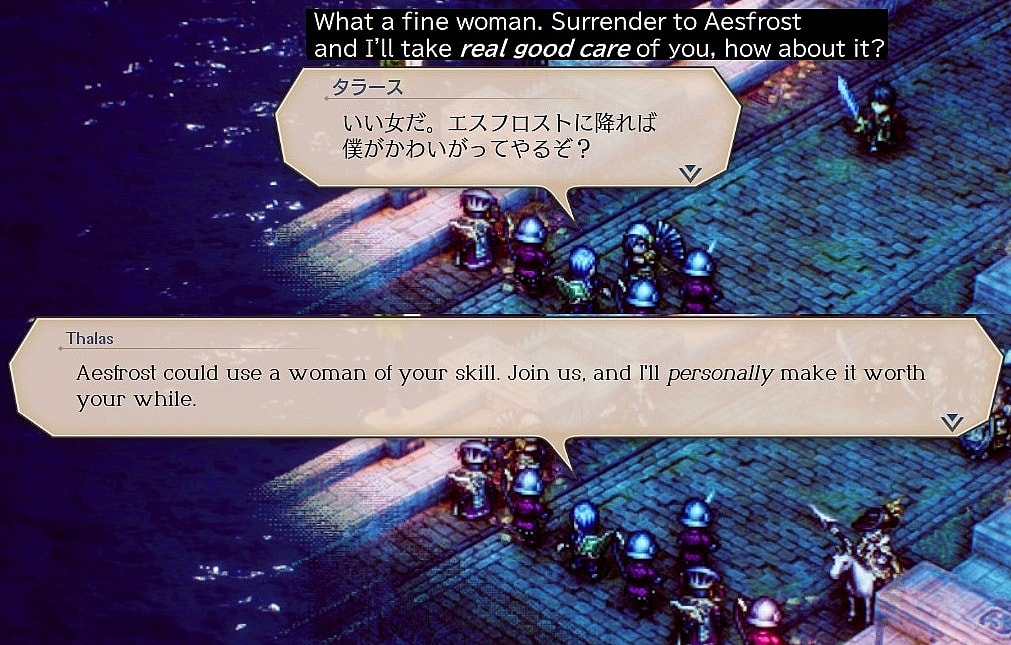
Other changes to Triangle Strategy seemed to completely overwrite the original intent. @iuntue highlighted how in Japanese, Svarog, Frederica’s uncle, asks Serenoa to take care of her. Yet in English, this is made more into a joke.
Japanese:
Svarog: Take care of Frederica, son. I won’t forgive you if you make her cry, you hear?
English:
Svarog: A word of advice, lad: you’d do well not to anger her.
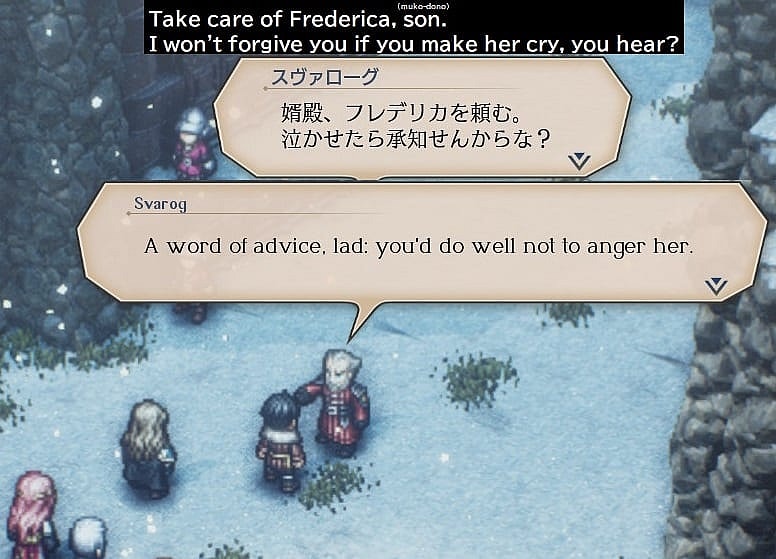
RELATED: Kotaku Hates Lost Ark’s Sexy Outfits Despite Western Release Already Being Censored
In a surprising reversal of what would be expected, one scene was actually made more serious in English. In Japanese, Trish quips, “Can’t hate a generous man” after being paid for her services, while in English she simply says, “Thank ye kindly for yer generosity, Yer Grace.”

When Maxwell is confronted and ultimately killed by Avlora, the scene’s intent is also slightly altered. As @iuntue explains, in Japanese he “accomplishes what he said” at the cost of his life, letting his allies get away.
In English, he postures as though he truly believes he will win, but “eats his words.” It could be argued here he is posturing in order to distract, buy more time, demoralize his foes, or simply go out in a blaze of glory while boasting.
Japanese:
Avlora: So you wish to hinder us to the bitter end, Maxwell!
Maxwell: You will go no further.
English:
Avlora: Release him to me and there may be mercy for you yet, Maxwell.
Maxwell: ‘Tis you who should be seeking mercy.
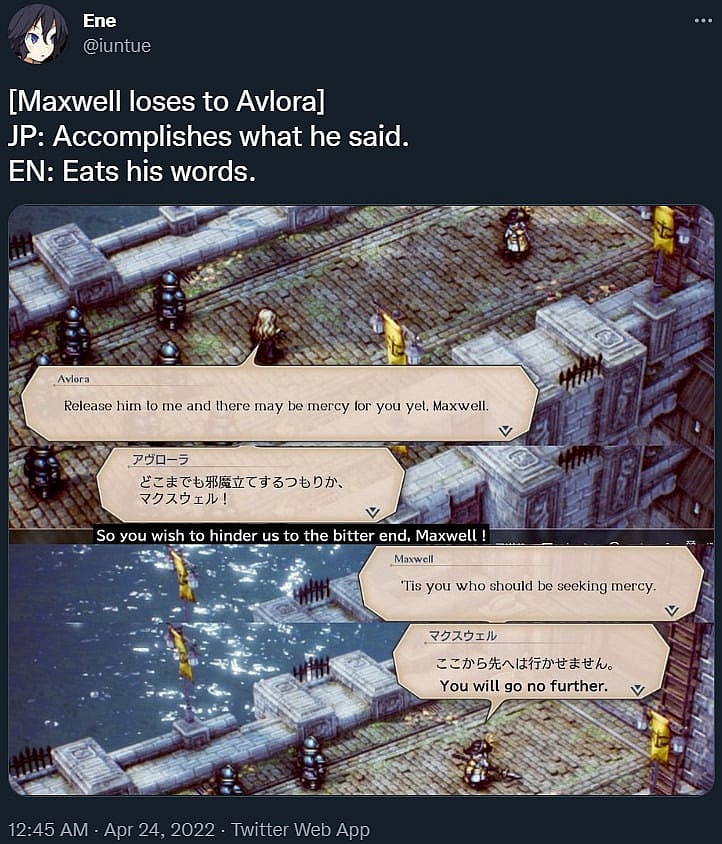
Yet more unnecessary additions were also shown in the scene between Cordelia and the Archduke. While both scenes have her plead the Archduke to trust her, in English it’s also added that she doesn’t wish to be trusted like a child.
Japanese:
Cordelia: Archduke, will you not trust the woman you mean to make your wife?
English:
Cordelia: If we’re to be wed, then there should be trust between us. How long do you intend on treating me like a child?
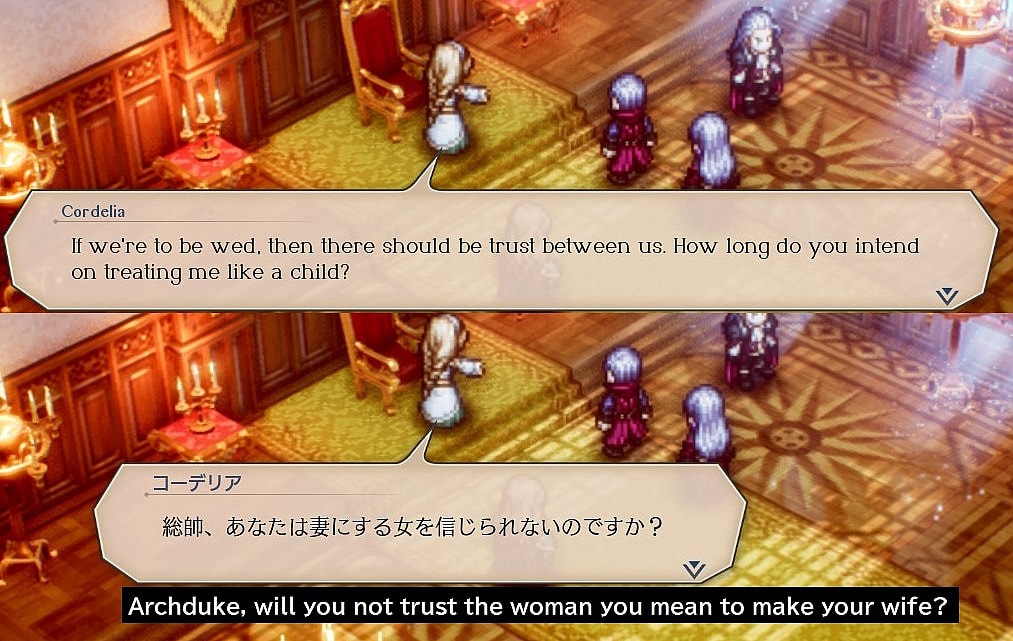
Cordelia also says she will never forgive the Archduke, while in Japanese more is added yet again.
Japanese:
Cordelia: … I, will never forgive you!
English:
Cordelia: I spit on your forgiveness! I’ll never return your hollow gestures!
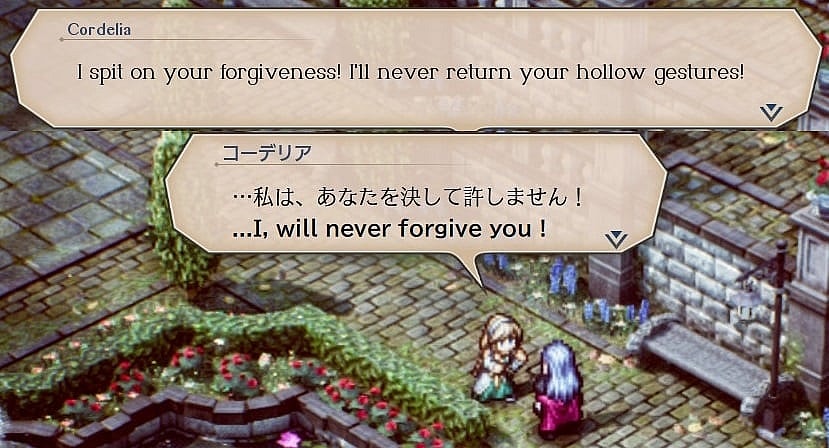
Further additions were also made when the protagonists meet Avlora.
Japanese:
Clarus: The lady over there is General Avlora.
English:
Clarus: The imposing-looking woman over there is General Avlora of Aesfrost.
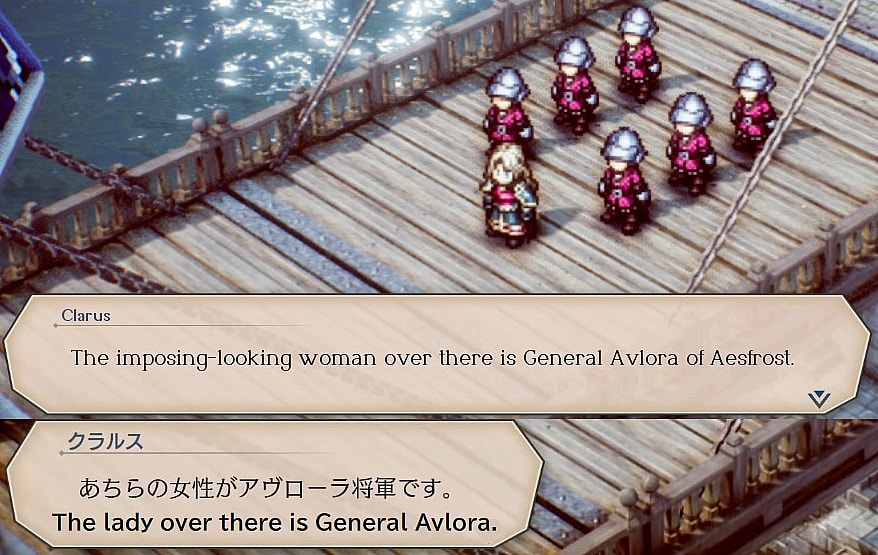
There were even cases where lines were cut from the original Japanese.
Japanese:
Jerrom: No more will we be taken from! Show them the pride of the Roselle!
English:
Jerrom: You will take naught from us this day!

@iuntue also shows how Gustadolph has very different reactions to his mother. In Japanese, he clearly remembers she was- as @iuntue paraphrases- “a tough and beautiful lady.” While in English he “barely remembers her now.”
Japanese:
Gustadolph: My father’s concubine Orlaea-dono too is a Rosellan. She was a valiant and beautiful lady…
English:
Gustadolph: I’ve only the faintest memories of her now. She was my father’s mistress, and a Rosellan.
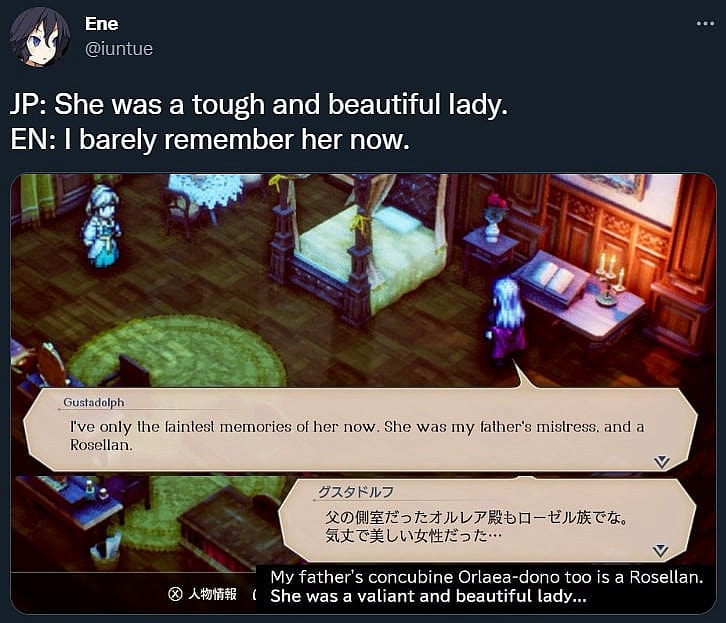
The final comparison as of this time of writing @iuntue shows yet again the localizers avoiding using the word woman. In English, Thalas avoids calling Cordelia “that woman” in disgust, and instead calls her a “pitiful little puppet.”
Japanese:
Thalas: I don’t recall ever acknowledging that woman!
English:
Thalas: I refuse to acknowledge that pitiful little puppet as queen.
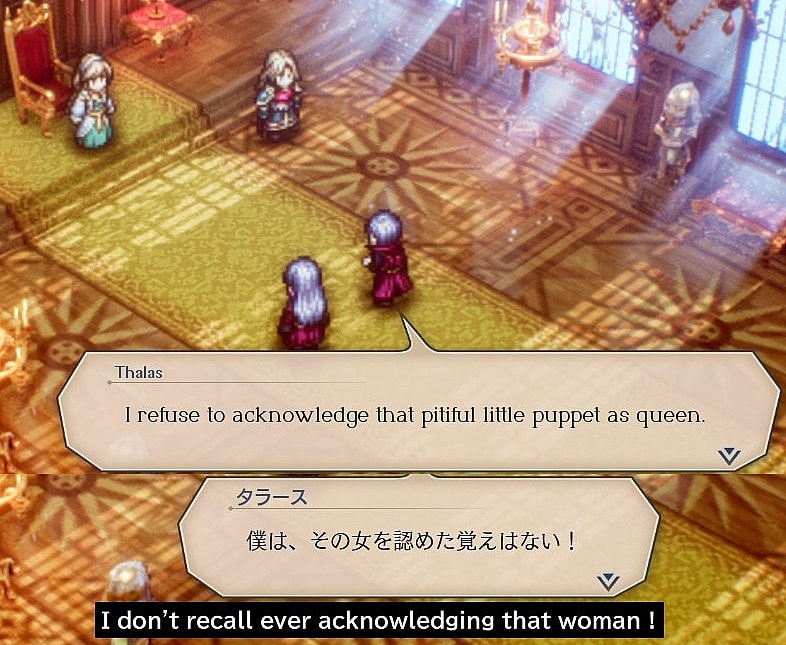
In summation, the English localization for Triangle Strategy seems to have plenty of times where it’s inaccurate. This can be adding or removing lines, and at worse changing the lines’ entire intent.
YouTuber Vara Dark noted in her coverage of the localization “this was actually a game I was pretty interested in, I know a lot of people have been talking about it on social media. I had briefly looked into it, I figured I was going to wait a little bit before I purchased it, but this is just such disappointing news.”
“It is so disappointing to see this happen,” Vara continued. “I want games to be translated as accurately to the source material as possible. When I’m playing a game that was translated from Japanese to English, I want it to be as close to the original as possible.”
“I wanna see what the original writers were intending me to experience during this moment, whether it’s cutscenes or just some character dialogue; and it’s so sad to have to know I’m playing a game that could potentially be censored and toned down because I cannot read both languages, so I cannot experience it in it’s original language.”
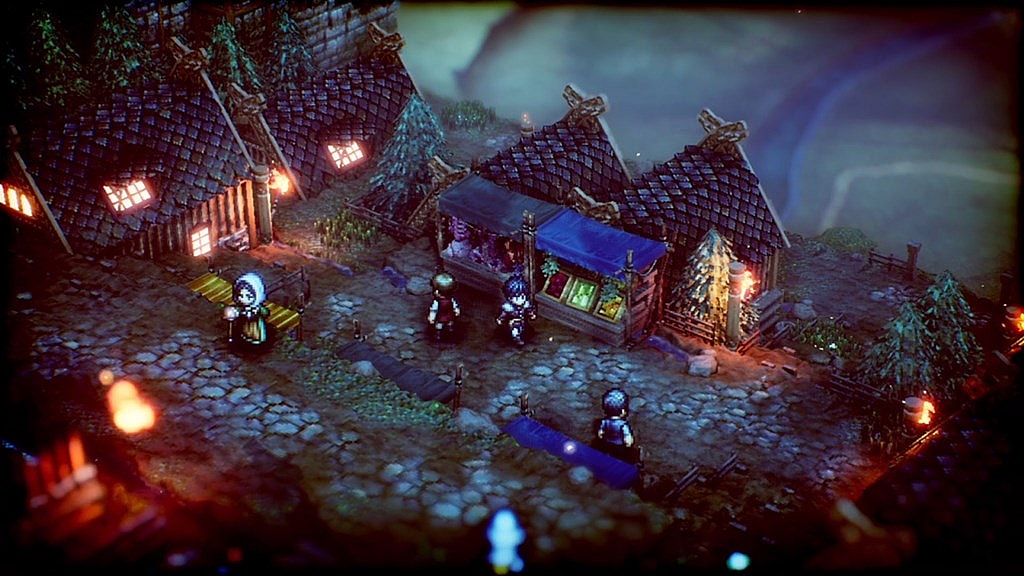
“The Square Enix ethics department strikes again!” Vara proposed, “I have loved Square over the years, they have some amazing franchises, but with every new release we’re seeing situations like this- there’s dialogue being altered, character outfits or models being toned down, it makes me not wanna support them anymore.”
“It is so sad to see this happening time and time again, because you hope that with their next release they’re going to change, maybe the ethics department will just leave this game alone, but no no, it’s getting worse and worse as time goes on.”
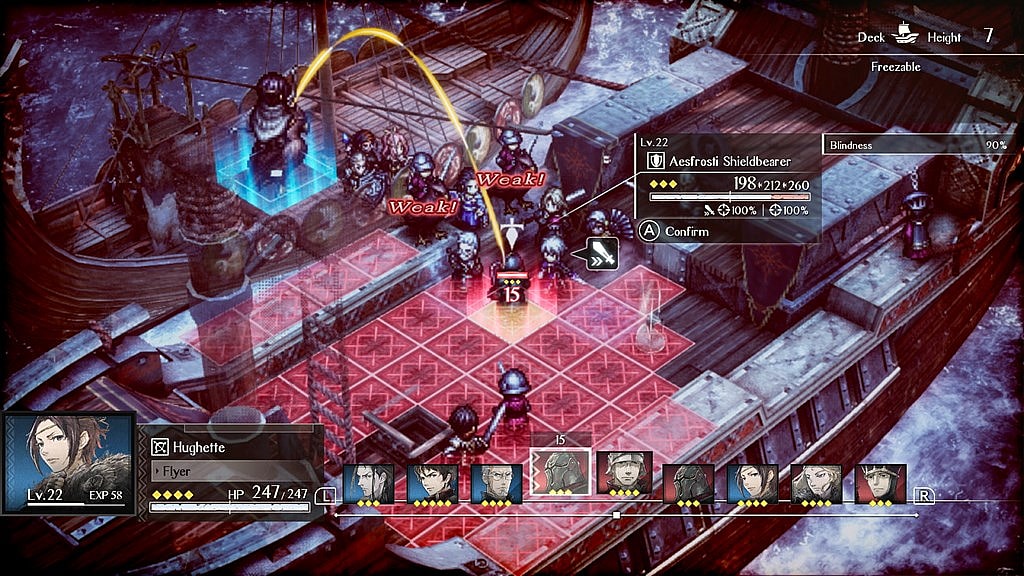
“I never thought gendered terms would become so offensive,” Vara scoffed, “but apparently now they are. As a woman I have felt perfectly represented in games, I’m not someone who sits here and says ‘developers need to do better and be more inclusive.'”
“But to hear them doing this- completely erasing any gendered terms from games- is absurd, and these are things that ‘game journalists’ a.k.a. the hacks who work at places like Polygon and Kotaku should be writing about.”
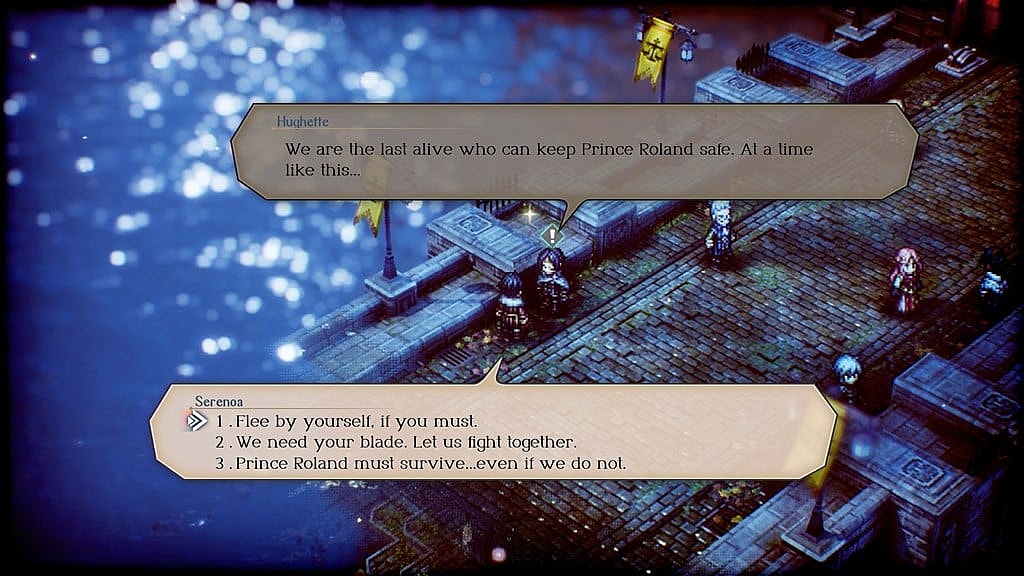
“They complain about developers needing to do better, include more women in games, this and that. But when they’re sitting here removing terms like ‘woman,’ they’re silent! And it’s disgusting.”
“They also should be doing articles about how localizers are taking games and changing whatever they feel like,” Vara bemoaned, “and in some cases throwing out original dialogue for what they think is better, yet they’re also not doing that.”
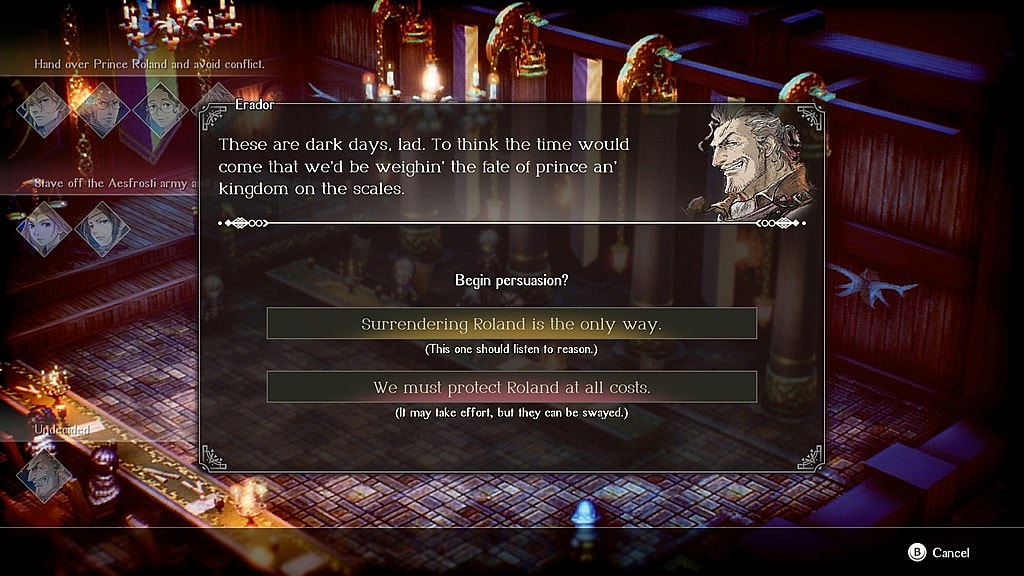
“This is why no one really trusts ‘game journalists,’ and now we’re forced to not even trust developers, we’re forced to not trust localizers,” Vara listed, “because more and more situations like this are happening.”
“Like I mentioned, I’ve been talking a lot about a lot of localizers changing content in video games over the past few weeks, and a lot of those situations have revolved around Square Enix,” Vara explained, referring to Chrono Cross Remastered’s censorship, which expanded to even the Japanese version of the game, seemingly removing panty shots and sexually suggestive dialogue.
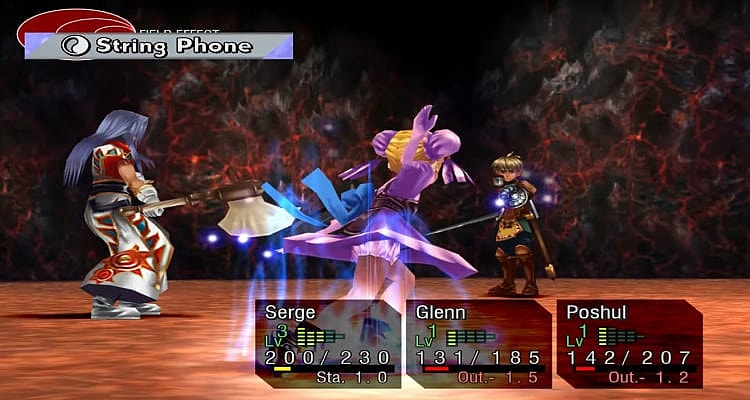
“Now as a woman,” Vara notes, “I don’t feel like they’re helping me at all, I don’t feel like they’re doing me this giant favor by changing dialogue to not use gendered terms, I think it’s ridiculous.”
“I don’t know what women they’re listening to saying they need to change dialogue for it to be less offensive to us, but they definitely do not represent me.”
 “I wish Square Enix would go back to the way they once were, where they let their developers just create what they wanted, and what they felt would sell” Vara agonizes, “but the higher-ups are too worried about trying to make their products appeal to what they consider is a modern audience that doesn’t exist, that now we’re losing out on good experiences and these amazing ideas writers and creators have.”
“I wish Square Enix would go back to the way they once were, where they let their developers just create what they wanted, and what they felt would sell” Vara agonizes, “but the higher-ups are too worried about trying to make their products appeal to what they consider is a modern audience that doesn’t exist, that now we’re losing out on good experiences and these amazing ideas writers and creators have.”
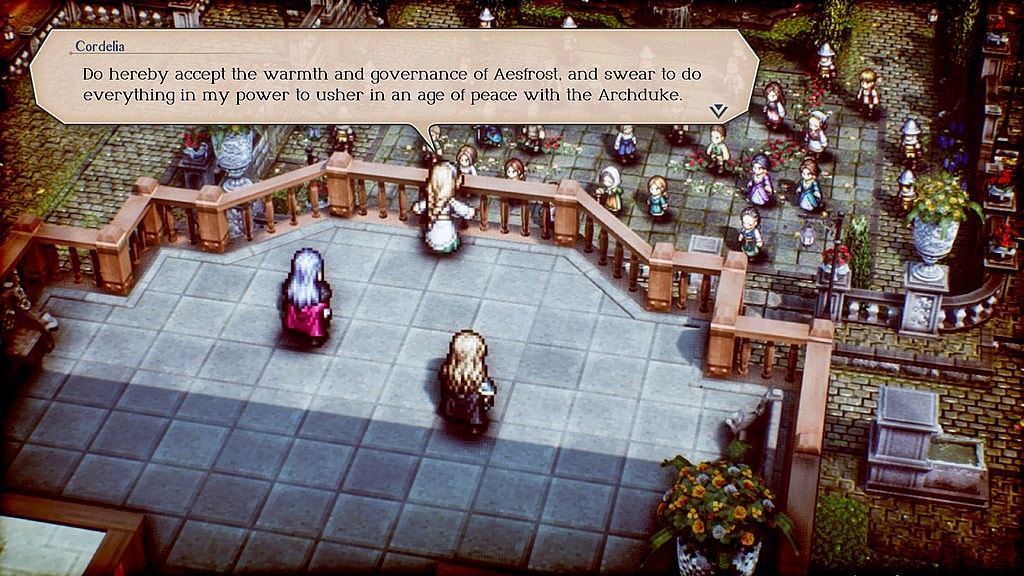
“Obviously I wish I could sit here [and] say ‘I think Square Enix is going to change, I think they will start listening to consumers,’ I just don’t think that it’s possible at this point for them to change all of the mistakes they’ve made.”
“We can still have hope, but ultimately, I think it’s looking pretty negative in terms of Square Enix now,” Vara concluded.

What do you think? Are some of the above examples acceptable localization? Let us know what you think on social media and in the comments below.
NEXT: Nintendo Switch Release Of 13: Sentinels: Aegis Rim Keeps “Non-Binary” Localization Changes
